
Feature Story
King Goodwill Zwelethini commended on his visionary response to HIV in Kwazulu-Natal, South Africa
30 September 2011
30 September 2011 30 September 2011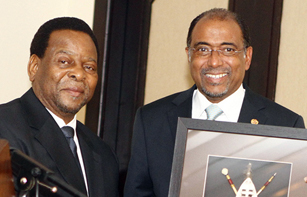
UNAIDS Executive Director, Mr. Michel Sidibé (right) receives a token from His Majesty King Goodwill Zwelethini.
Credit: UNAIDS/A.Debiky
During his seven-day visit to South Africa, the UNAIDS Executive Director, Michel Sidibé had the opportunity to meet His Majesty King Goodwill Zwelethini, in his home province of Kwazulu Natal.
The King is a key figure in the response to HIV in the Province, home to the Zulu nation. In what was lauded as a bold move, in mid-2009 the King called for Zulu men and boys to undergo medical male circumcision (MMC) in a bid to protect themselves against HIV. Studies have shown that MMC can reduce the sexual transmission of HIV by approximately 60%.
At the time of the King’s announcement it was mainly Xhosa, Sotho, Ndebele and Shangaan people who underwent traditional circumcision as part of a boy’s initiation into manhood.
Traditional circumcision among Zulu men was banned in the time of King Shaka.
The health of the nation can only improve if we create a permanent, unified front against the epidemic
His Majesty King Goodwill Zwelethini
However, now over two centuries later the current King of the Zulus has revived the practice of circumcision to try to save the lives of his people. The King’s decision was motivated by the disproportionate impact of HIV on the Zulu people.
Mr Sidibé commended the King on his vision and leadership around HIV, particularly on male medical circumcision and on his continued personal engagement in the response to HIV.
Thanking Mr Sidibé for his support to South Africa’s AIDS response and calling for the need for strong partnerships the King said, “The health of the nation can only improve if we create a permanent, unified front against the epidemic…..I am on the winning side but without support of the outside world I cannot win this war.”
Related

Feature Story
KwaZulu Natal adopts a holistic approach to HIV
30 September 2011
30 September 2011 30 September 2011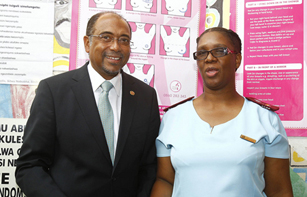
Mr. Sidibé visited the Halley Stott Primary Health Clinic in Botha’s Hill where Sister S.B. Shawuka, the Operational Nursing Manager of the clinic show him how integrated health services are serving the needs of the local community.
Credit: UNAIDS/A.Debiky
The Province of Kwazulu Natal, South Africa, has been widely acknowledged as leading the provincial response to HIV in the country. Its integrated approach to service delivery means that people who are accessing services are those who need them the most.
Part of this integrated approach is the innovative Operation Sukuma Sakhe (Let us stand and build), where data is collected on the health, social and economic needs of households in the local community.
The data is collected by a War Room Task Team, comprised of community volunteers called cadres, who ‘profile’ households in order to assess their needs. This data is then taken to a ‘War Room’ at the clinic where a committee meets to discuss and process the data they have gathered on households before referring to the appropriate government department to deliver the services needed to the households.
“The district has more than 60 volunteer cadres, which is quite a lot for the size of the district. I do this job because of the thrill I get from knowing that I am helping people with their problems”, says Vukani Ndlovu, the war room task team supervisor.
It is this unique approach to the integration of services which drew UNAIDS’ Executive Director, Mr. Michel Sidibé, to meet with policymakers, implementers and community members in KwaZulu Natal Province on the second day of his official visit to South Africa.
The province is showing a major commitment to HIV prevention by pushing a holistic approach to health services
UNAIDS Executive Director Michel Sidibé
Mr. Sidibé visited the Halley Stott Primary Health Clinic in Botha’s Hill, located in the strikingly beautiful Valley of a Thousand Hills area just outside Durban. At the clinic, Mr. Sidibé was shown how integrated health services are serving the needs of the local community.
“We offer a range of services at the clinic, from HIV prevention, counselling, testing and treatment, preventing mother-to-child transmission of HIV to TB, paediatric care, cervical and breast cancer screening and even psychiatry and dentistry,” explained Sister S.B. Shawuka, the Operational Nursing Manager of the clinic.
The clinic also does regular community outreach through its mobile clinics, offering HIV testing and counselling, immunisations, cancer screening and raising awareness on the health services offered. They recently conducted a community outreach campaign in partnership with a local NGO to teach women how to do monthly checks for breast cancer.
“The province is showing a major commitment to HIV prevention by pushing a holistic approach to health services,” said Mr Sidibé. “I am heartened to see how KwaZulu Natal is leading innovation with a successful model which I hope other Provinces will replicate.”
Related

Feature Story
Lessons to be drawn from KwaZulu Natal’s integrated approach to HIV, health and social services
29 September 2011
29 September 2011 29 September 2011
Premier of KwaZulu-Natal Dr Zweli Mkhize (left) and UNAIDS Executive Director. 29 September 2011.
Credit: UNAIDS/A. Debiky
The Executive Director of the Joint United Nations Programme on HIV/AIDS (UNAIDS) commended the Premier of KwaZulu-Natal Dr Zweli Mkhize on his commitment to integrating HIV with health and social and economic services.
Through the integrated approach adopted in KwaZulu-Natal local communities have a one stop shop through which they have easy access to information, health services and a broad range of social and economic services addressing poverty, education and development.
“This holistic approach to accessing health and social services is not only efficient but effective and serves as a model for other provinces and indeed other countries across the region,” said Michel Sidibé who was on a seven day visit to South Africa to learn more about the progress and challenges the country is facing in scaling-up its response to HIV. “The work being done here is an example of how to bring services to the heart of the community, to where they are most needed.”
The Premier of KwaZulu-Natal, Dr Zweli Mkhize, has played a leading role decentralising South Africa’s AIDS response and in integrating HIV into the economic and social agenda of the province. The provincial government has put in place integrated programmes to address HIV, TB, breast and cervical cancer, poverty, food security, and a range of other health and social services.
“By bridging HIV services with other services the community needs we believe that we can help South Africa to reach our national targets of reducing the number of new HIV infections by 50% by 2015 and in significantly expanding the number of people on antiretroviral treatment,” said Dr Zweli Mkhize. “Our model is working.”
HIV prevalence was 39.5% in 2009 in KwaZulu-Natal, the highest in South Africa. The integrated approach adopted by the provincial government of KwaZulu-Natal has already contributed to increasing the uptake of HIV testing reaching 2.9 million people in the Province as of end of June 2011. It has also expanded access to lifesaving antiretroviral therapy to 489 801 in 518 sites in the Province and in reducing the rate of infections from mother to child from 21% five years ago to 2.8% in 2011.
Related

Feature Story
UNAIDS Executive Director official visit to South Africa
28 September 2011
28 September 2011 28 September 2011
South African Minister of Health Aaron Motsoaledi (left) and UNAIDS Executive Director Michel Sidibé.
Credit: UNAIDS/P.Thekiso
UNAIDS Executive Director Michel Sidibé started a seven-day visit to South Africa on 27 September which will focus on the country’s efforts to ending new HIV infections amongst children by 2015, HIV integration services and bridging the science and implementation divide.
Also high on the agenda is South Africa’s campaign to reach people with HIV testing and counseling services. Mr Sidibé met with South African Minister of Health Aaron Motsoaledi to discuss progress since the launch of the campaign in April 2010.
At the start of the campaign around 2 million people were tested for HIV—by September 2011 that number had risen to more than 13 million.
The Minister outlined that one of the most successful strategies had been bringing HIV testing and counseling to people—from workplaces to villages. By creating an open environment Minister Motsoaledi said, “People didn’t need to ask for an HIV test, it was the government asking people to participate.” At the HIV testing and counseling sites people could find out their HIV status, as well as other health needs such as blood pressure checks and cervical cancer screening.
The Minister also discussed the uptake in HIV treatment, highlighting that an additional 400 000 people nationwide had started on antiretroviral therapy since the beginning of the campaign. The government reports that HIV treatment is now available in more than 2 000 centers—up from 490 at the start of the campaign.
“South Africa has shown visionary leadership in the AIDS response in recent years. In such a short period of time real results for people can be seen across the country.” said Mr Sidibé. “I am looking forward, over the next few days to meeting the men and women who are making this happen and the families which are seeing the benefits.”
South Africa has shown visionary leadership in the AIDS response in recent years. In such a short period of time real results for people can be seen across the country
UNAIDS Executive Director Michel Sidibé
During the next week Mr Sidibé will be looking at how UNAIDS can support South Africa in achieving its commitment to ‘Zero new HIV infections’ in children and will visit a clinic providing services to families in Guateng province. He will also be drawing lessons from South Africa’s engagement to integrate HIV services with other health services as he visits a clinic in Durban providing HIV, tuberculosis, sexually transmitted infection and female cancer services.
Mr Sidibé will meet with provincial officials to discuss some of the challenges they face in implementing programmes in urban and rural areas and how they are overcoming them. He will also be meeting with some of South Africa’s top scientists, researchers and implementers to see how recent scientific breakthroughs in the AIDS response can be turned into a reality for the people who need them most.
Related

Feature Story
Integrating human rights, gender equality and HIV prevention in national HIV responses
27 September 2011
27 September 2011 27 September 2011
Credit: UNAIDS
UNAIDS brought together nearly 60 participants from 12 countries across Eastern and Southern Africa to a 3-day training workshop on expanding human rights, gender and HIV prevention programmes in national responses to HIV. The workshop took place in Johannesburg from 20 – 23 September.
Participants analysed how to incorporate into their National Strategic Plans (NSP) programmes that can reduce stigma, address gender inequality and increase access to justice in the context of HIV. The programmes reviewed were the ones identified in the 2011 Political Declaration, adopted by Member States at the UN High Level Meeting on AIDS, as essential to addressing HIV-related stigma and discrimination in national HIV responses.
Governments committed to implement programmes that focus on sensitizing police and judges; training health care workers in non-discrimination, confidentiality and informed consent; supporting national human rights learning campaigns, legal literacy, and legal services, as well as monitoring the impact of the legal environment on HIV prevention, treatment, care and support. They also committed to protect the rights of women and end gender-based violence in the context of HIV.
Participants agreed that HIV programmes based on human rights and gender equality are key means by which to make national AIDS responses more people-centered. “Unless the legal and social environments are protective of the people living with and vulnerable to HIV, people will not be willing, or able, to come forward for HIV prevention and treatment,” emphasized Sheila Tlou, Director of the UNAIDS Regional Support Team East and Southern Africa.
Unless the legal and social environments are protective of the people living with and vulnerable to HIV, people will not be willing, or able, to come forward for HIV prevention and treatment
Sheila Tlou, Director of the UNAIDS Regional Support Team East and Southern Africa.
During the workshop, each participating country team reviewed a human rights and gender analysis of their current National Strategic Plans produced ahead of the meeting by the International HIV/AIDS Alliance and Heard. These analyses confirmed results of earlier studies pointing out that human rights and gender equality are often cited in the introduction of the NSPs as important principles, and some programmes to support them may be mentioned. However, these programmes are often not included at the costing and budgeting phase, and when implemented, are seldom evaluated or taken to scale.
“It is imperative that we promote the incorporation of human rights and gender equality principles in our NSP. We need to move from mere acknowledgement of these principles to putting them at the forefront of the response to the HIV epidemic,” acknowledged Sylvie Pool from the Department of Legal Affairs of the Seychelles in representation of the country team.
By the end of the workshop, each country team had developed national action plans with specific commitments to integrate human rights and gender programmes in their NSP. Such commitments include the review of national strategic plans to identify human rights and gender gaps; costing of gender and human rights activities; training of civil society on human rights and gender issues so they can have better input into the national planning process; and mobilizing additional funding to implement HIV programmes with integrated human rights and gender principles.
“While integrating human rights and gender equality in the national AIDS strategic plan would appear challenging amidst competing priorities, it is possible!” saib Mr Lole Laile Lole, Chairman of the South Sudan Network of People living with HIV.
Participants in the workshop included technical experts involved in HIV strategic planning at country level, officials from national AIDS commissions, Ministries of Health, Gender and Planning, civil society organizations and people living with HIV. A wide range of facilitators also participated including UNDP, the Office of the High Commissioner for Human Rights, the World Bank, the International HIV/AIDS Alliance, Athena and Heard.
Countries selected to participate in the training were those currently engaged in adopting or revising national strategic plans to guide their response to the HIV epidemic. Two other such workshops will be held in 2011, one in Asia Pacific and one in the Middle East and North Africa.
Related

Feature Story
Young drug users in Latin America need a stronger HIV response
26 September 2011
26 September 2011 26 September 2011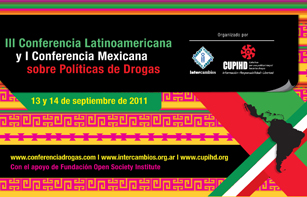
The 3rd Conference on Drug Policies in Latin America that took place in Mexico City from 13-14 September brought together experts, academics, civil society organizations legislators and decision makers to discuss drug consumption trends, drug related problems and the policies and interventions developed in the region.
This year, there has been a very active participation from young people in the conference according to Aram Barra, programme director for youth and drugs in ESPOLEA—a Mexican youth platform working on gender, HIV and drugs from a human rights perspective. “We have been gathering a group of young activists since 2009 to promote the inclusion of young drug users in the yearly conference,” he explains. “This year we have made a difference. We moved from being passive spectators to taking active part in the discussions on an equal footing with experts and other decision makers,” said Mr Barra.
Over the course of three days, the conference promoted a social debate around different issues such as HIV among injecting drug users as well as the need for evidence based information covering the situation of youth and policies based on human rights. Reducing by 50% the number of new HIV infections among injecting drug users by 2015, as stated in the political declaration agreed by Member States at the 2011 High Level Meeting on AIDS was a constant reference throughout the conference.
The HIV epidemic in Latin America is mainly concentrated among men who have sex with men and transgender people. However, some countries like Brazil, Uruguay, Argentina and Mexico are showing prevalence rates around 5 % among injecting drug users.
“We need political will in Latin America to implement the right harm reduction policies and opioid substitution therapy programmes. We need to increase access to information about HIV, clean needles and syringes, create peer support environment and, for people infected with HIV, provide timely access to effective antiretroviral therapy,” said Enrique Zelaya, the UNAIDS Coordinator for Guatemala and Mexico.
The youth need to be involved to make programmes work on the ground and increase their impact
Aram Barra, programme director for youth and drugs in ESPOLEA
The youth in ESPOLEA emphasized the need for a supportive environment to make the goal set in the 2011 Political Declaration achievable in Latin America. “We need to see policy change that decriminalizes drug users and implement harm reduction programmes that take young drug users needs into account”.
According to the youth group, the young crack users in the suburbs of Montevideo and the injecting drug users at the Mexican borders are part of a diverse group of drug users all with different needs and exposing themselves to different risks. There is a need to respond to these complex realities when policies are developed and services put in place.
“The youth need to be involved to make programmes work on the ground and increase their impact. Working together with UNAIDS, UNODC and governments we can achieve the goal of reducing infections by 50 % among injecting drug users,” concluded Aram Barra.
External links
External links
- ESPOLEA (in Spanish)
Related

Feature Story
UNAIDS welcomes three new fellows in the fourth edition of its Special Youth Fellowship Programme
22 September 2011
22 September 2011 22 September 2011
Abhinav Singh from India, Ritah Namwiza from Uganda and Anthony Adero, UNAIDS Special Youth Fellows 2011.
Credit: UNAIDS
Abhinav Singh from India, Ritah Namwiza from Uganda and Anthony Adero from Kenya have just joined the UNAIDS headquarter in Geneva, as the fourth round of the UNAIDS Special Youth Fellowship programme. Designed to create opportunities for young people from low- and middle income countries to contribute to HIV programme and policy development, the programme ensures a two-way transfer of skills between the fellows and UNAIDS staff.
Founder of the youth led organization The Dove Foundation, Abhinav Singh was working with the Uttrakhand State AIDS Control Society when he was accepted as the first ever fellow from India.
“Being the first from my country makes me feel delighted and also brings in a lot of responsibility towards the young people in India,” said Abhinav Singh. “I expect to learn profoundly and also gain quality experience for working with young people and HIV in my country. Being in UNAIDS Secretariat is like a dream come true for a public health professional and I feel really privileged to be a part of this global team.”
Most young people still have limited access to good quality education and sexual and reproductive health programmes that provide the information, services and commodities to protect themselves from HIV. The Special Youth Fellowship programme aspires to build the capacities of young people and reinforce their leadership skills to strengthen national responses to HIV.
This is a great learning opportunity—I will interact with people who have a wealth of experience in their respective fields. Everybody has been so helpful and welcoming!
Ritah Namwiza, UNAIDS Special Youth Fellow 2011
“I was thrilled to be chosen for the fellowship” said Ritah Namwiza, who previously worked with young people’s HIV outreach programmes in Uganda. “This is a great learning opportunity—I will interact with people who have a wealth of experience in their respective fields. Everybody has been so helpful and welcoming!”
Selected through an open and competitive process, the youth fellows spend 4 months at the headquarters in Geneva, followed by 5 months in the UNAIDS Country Office in the fellow’s country of origin.
Anthony Adero, from Kenya, is a youth peer educator and activist for the rights of the Lesbian, Gay, Bisexual and Transgender communities. He felt it was a dream come true to be accepted to the programme. “To have this opportunity to develop my capacity on youth programs and leadership skills, I am very elated to be part of this programme. I hope to learn, get mentored and grow strategically to develop a strong leadership role in AIDS response in Kenya!”
Instituted in 2008, so far 12 fellows completed the programme. The SYP alumni are working in various capacities to strengthen the HIV response at global and national level.
Related
 “Who will protect our young people?”
“Who will protect our young people?”

02 June 2025

Feature Story
UNAIDS receives British Medical Association book award for its 2010 OUTLOOK report
21 September 2011
21 September 2011 21 September 2011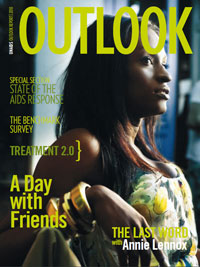
The UNAIDS 2010 OUTLOOK report received first prize in the category of popular medicine from the British Medical Association during their annual Book Awards ceremony that took place in London on 14 September 2011. OUTLOOK won in a category with many entries where six other titles were short-listed as highly commended.
“This is a glossy magazine that isn't glossy but its production values are very high and it's attractive and well-designed,” said one of the judges. “The subject matter is well-explained without being overly technical and dry. The interviews and 'human interest' angle mesh well with the facts and technical content. It works very well, I've never seen it done like this before. A good intelligent read, well-dressed up to be appealing.”
The Book Awards aim to encourage and reward excellence in medical publishing. Prizes are awarded in 21 categories, with an overall BMA Medical book of the year award made from the category winners.
The OUTLOOK report was launched in Geneva ahead of the XVIII International AIDS Conference that took place in Vienna from 18 – 23 July 2010. The report is filled with data, powerful testimonies and forward-looking assessments on the global AIDS epidemic.
To be recognized by this distinguished institution shows that we can push creative boundaries while keeping true to the science which allows us to reach new audiences with information on important issues in the AIDS response
UNAIDS Director of Communications Annemarie Hou
The report outlined a simplified HIV treatment platform called Treatment 2.0 that could drastically decrease the number of AIDS-related deaths and could also reduce the number of new HIV infections. Also in the report, a UNAIDS and Zogby International public opinion poll shows that nearly 30 years into the AIDS epidemic, region by region, countries continue to rank AIDS high on the list of the most important issues facing the world.
A dedicated web site was also developed in conjunction with the report which provided additional information to some of the articles in the form of videos, images or additional text.
The production of the report was coordinated by the UNAIDS Director of Communications Annemarie Hou who stressed the need for innovative approaches to the AIDS response. “To be recognized by this distinguished institution shows that we can push creative boundaries while keeping true to the science which allows us to reach new audiences with information on important issues in the AIDS response,” she said. “This report could not have happened without the amazing collaboration of partners around the world.”
The BMA is the medical doctors’ professional organization established to look after the professional and personal needs of its members. The BMA represents doctors in all branches of medicine throughout the United Kingdom.
External links
External links
Publications
Publications
Related
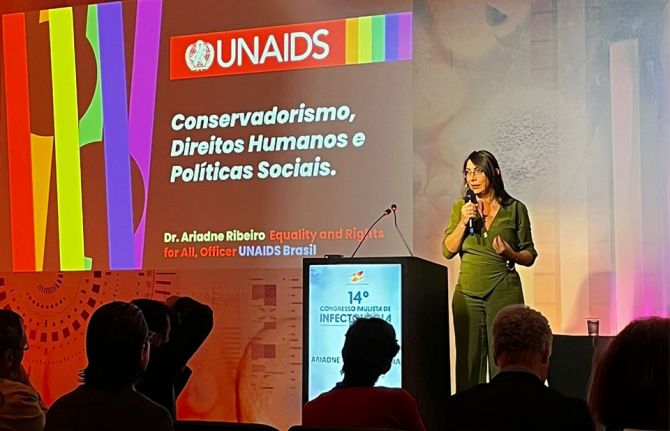 Upholding dignity for everyone: Ariadne Ribeiro Ferreira
Upholding dignity for everyone: Ariadne Ribeiro Ferreira

21 November 2024

Feature Story
United States stresses its commitment to the AIDS response at the United Nations
21 September 2011
21 September 2011 21 September 2011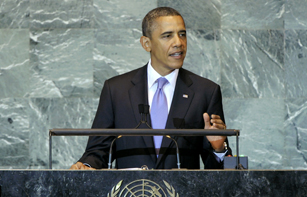
Barack Obama, President of the United States of America, addresses the general debate of the sixty-sixth session of the General Assembly.
Credit: UN Photo/Marco Castro
The President of the United States, Barack Obama, has stressed his country’s commitment to continue supporting the AIDS response, tuberculosis and malaria. In his speech to the United Nations General Assembly he also underscored the US’ commitment to the health of women and children. The annual high-level debate is taking place in New York from 21 – 30 September.
“To stop disease that spreads across borders, we must strengthen our systems of public health. We will continue the fight against HIV/AIDS, tuberculosis and malaria. We will focus on the health of mothers and children,” said President Obama.
Secretary-General Ban Ki-moon told world leaders present at the 66th session of the General Assembly that they face critical choices on global issues to ensure the well-being of future generations. “The first and greatest of these is sustainable development — the imperative of the 21st century,” said the Secretary-General. “We must connect the dots between climate change, water scarcity, energy shortages, global health, food security and women’s empowerment. Solutions to one problem must be solutions for all.”
To stop disease that spreads across borders, we must strengthen our systems of public health. We will continue the fight against HIV/AIDS, tuberculosis and malaria. We will focus on the health of mothers and children
President of the United States Barack Obama
In reaction to commitments to AIDS, health and women’s issues, Executive Director Michel Sidibé said, “When world leaders commit to finding health and development solutions, the burden of responsibility can be shared and the envelope for innovation pushed. I look forward to the world taking on pressing issues such as the elimination of new HIV infections among children by 2015.”
More than 120 heads of State and government are slated to address the Assembly during the debate.
External links
Related
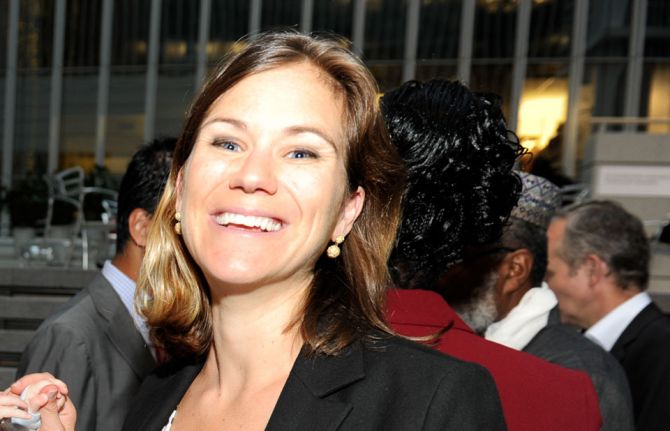 A tribute to Maeve Kennedy Townsend McKean
A tribute to Maeve Kennedy Townsend McKean

09 April 2020
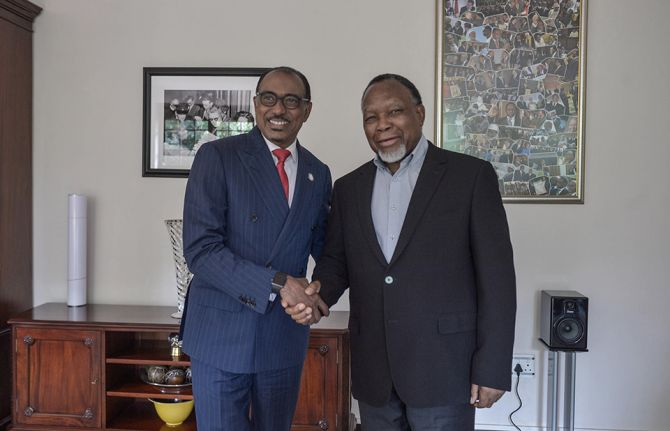 Keeping up the momentum in the global AIDS response
Keeping up the momentum in the global AIDS response

24 April 2019
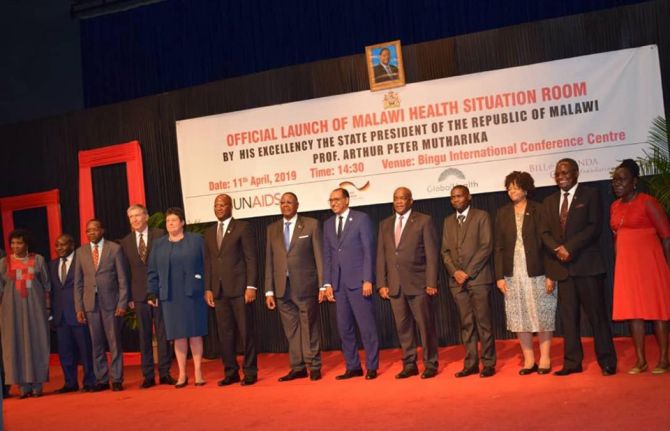 Malawi launches its health situation room
Malawi launches its health situation room

12 April 2019

Feature Story
Horn of Africa in crisis: famine, displacement and HIV
20 September 2011
20 September 2011 20 September 2011
Credit: UNAIDS/P.Virot
The ongoing drought and famine in the Horn of Africa has put the lives of millions of people in Somalia, Kenya, Djibouti and Ethiopia at serious risk. An estimated 13 million people in the region are in urgent need of humanitarian assistance, including food and medical care.
Central and southern Somalia are the areas hardest-hit in the region, where protracted civil conflicts, weak state structures and limited access to humanitarian assistance pose a complex set of challenges. According to the United Nations High Commissioner for Refugees (UNHCR), there are more than 800 000 Somali refugees in the Horn of Africa, of whom over 250 000 have fled to Kenya, Ethiopia and Djibouti since January 2011.
HIV in emergency settings
While HIV data in central and southern Somalia is scarce, experience and evidence have shown that people in emergency settings tend to have limited access to HIV prevention, treatment, care and support. The health of people living with HIV is put at further risk when their nutritional needs are not met. Displacement, loss of livelihood and increased sexual violence can pose additional risks of HIV infection.
An estimated 3 million Kenyans—among them approximately 90 000 people living with HIV—are affected by drought and food insecurity, especially in the semi-arid regions of northern Kenya. Most HIV services in the country are currently functioning, and treatment interruption is still low. However, the Joint United Nations Programme on HIV/AIDS (UNAIDS) and partners fear this situation may change as community-level interventions and nutritional support for people living with HIV are increasingly interrupted.
In recent weeks, many people in northern Kenya have moved to the slums of Nairobi, seeking a means to survive. City dwellers have faced a doubling of prices for key staple foods. The risk of unprotected transactional sex (or “food for sex”) is rising and could lead to an increase in the number of new HIV infections.
“If HIV-related vulnerabilities are not considered in emergencies, Kenya’s rallying call of an ‘HIV Free Society’ remains a far fetched dream,” said Prof. Alloys S. S. Orago, Director of Kenya’s National AIDS Control Council. “Reducing the vulnerability of people living with HIV in emergency situations requires the effective engagement of all stakeholders,” he added.
Response by UNAIDS and partners
Together with the World Food Programme (WFP) and UNHCR, the UNAIDS Secretariat and other Cosponsors have warned of the urgent need to provide HIV services to emergency-affected populations across the region.
In collaboration with regional partners and national authorities, the UNAIDS family has been working to assess the impact of the current crisis on the HIV epidemic and the related needs of affected populations across the Horn of Africa. This data is being used to effectively integrate HIV in the humanitarian response across the region.
If HIV-related vulnerabilities are not considered in emergencies, Kenya’s rallying call of an ‘HIV Free Society’ remains a far fetched dream
Professor Alloys S. S. Orago, Director of Kenya’s National AIDS Control Council
Many Somalis have fled to a refugee camp in Dadaab, northern Kenya, where comprehensive reproductive health and HIV services are available, including emergency obstetric care, HIV prevention services and the provision of antiretroviral treatment. All camp hospitals provide services for survivors of sexual violence, such as post exposure prophylaxis for HIV prevention, contraception and psychosocial support.
In Kenya, the UN family is collaborating with the national government and non-governmental organizations (NGOs) to ensure that HIV services are available in emergency-affected areas. UNHCR is conducting baseline surveys in the refugee camps and WFP is providing data on nutrition and HIV for the north and north eastern provinces, where drought-affected local populations also require continued HIV prevention, treatment, and care and support services.
In Ethiopia, UNHCR and partners—including more than 10 international NGOs—are working in refugee camps to reduce the transmission of HIV, prevent sexual violence, and provide care for survivors of sexual violence. From the start of the emergency, blood safety measures have been reinforced and male condoms have been made available. For people living with HIV, a national antiretroviral protocol is followed, including CD 4 testing, clinical monitoring and the promotion of treatment adherence.
As part of a wider continental response, the African Union (AU) recently pledged more than US $350 million to the humanitarian crisis in the Horn of Africa. At a meeting of AU Ministers and Heads of State on 25 August, all speakers expressed solidarity with affected populations and emphasized the need to tackle both the current crisis and underlying root causes, including conflict and climate change.
The UNAIDS family and partners will continue to monitor and respond to HIV needs in the Horn of Africa based on the 2010 IASC guidelines for addressing HIV in humanitarian settings. The HIV response in the region is guided by the UNAIDS vision of Zero new HIV infections, Zero discrimination and Zero AIDS-related deaths.






